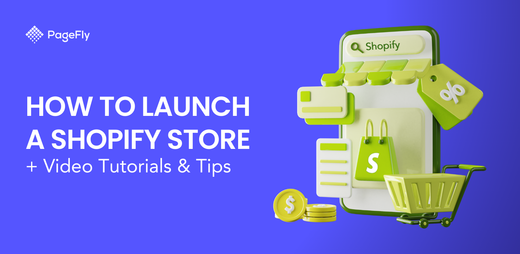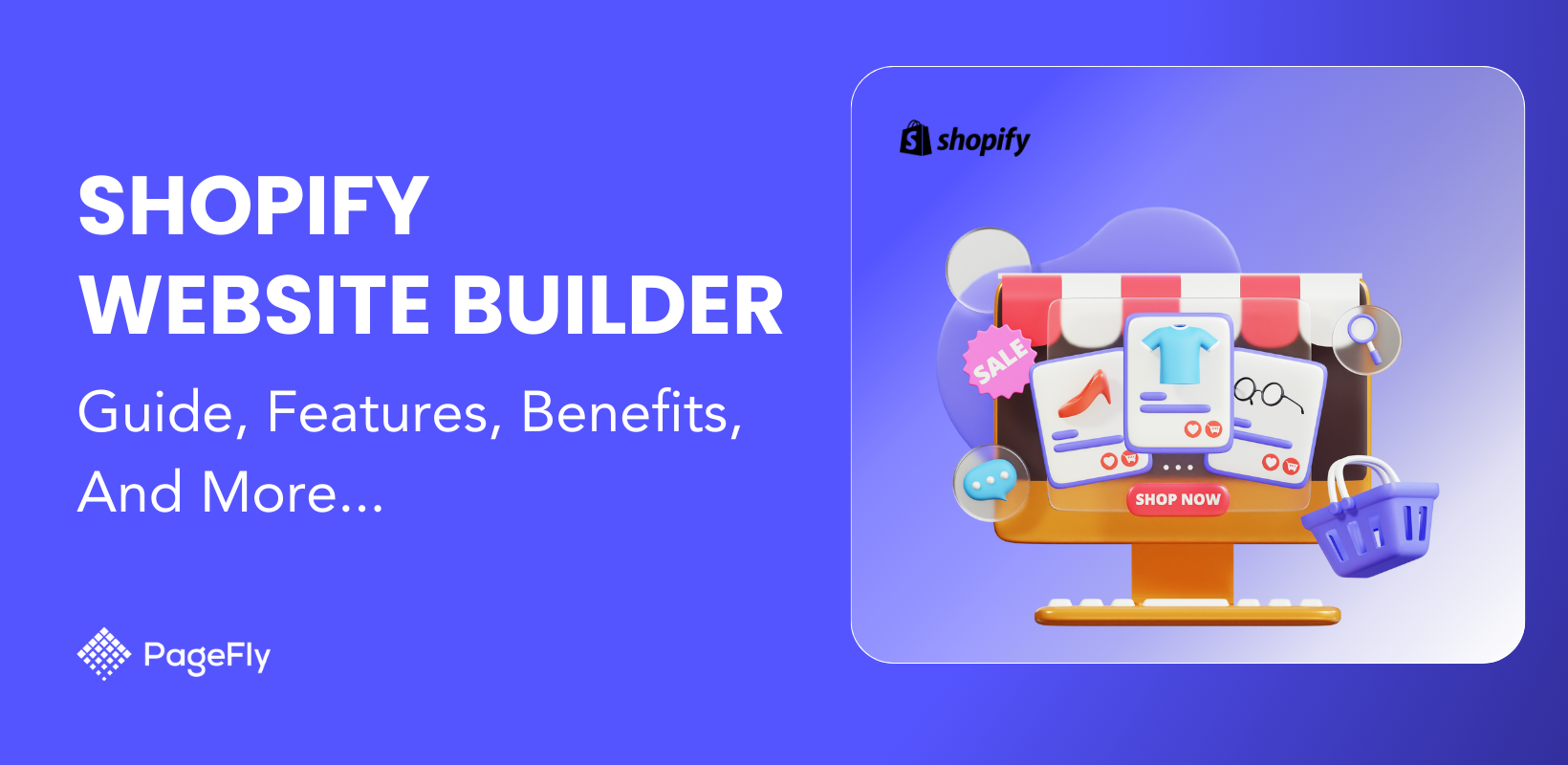The discussion between Shopify vs Etsy has been raging for many years. You may have heard that Etsy is a popular place for selling many handmade and craft design products and that Shopify can help merchants build online stores easily.
You sell incredible products and want to bring them online, but you're torn between selling on Shopify vs Etsy. Or, you already are an active seller on Etsy and are considering expanding your business with Shopify. Then, perhaps this article can help solve your problem. Understanding the pros and cons of Shopify or etsy can help you decide which platform is right for your business.
By taking a closer look at these two eCommerce solutions—you can make a more informed decision about your online business in the future.
Understanding Shopify and Etsy
So, what exactly are Shopify and Etsy?
What is Shopify?
Many merchants starting their eCommerce journey often ask,"What is Shopify?"Simply put, Shopify is a third-party platform that helps merchants build an online storefront. Sellers can easily create their stores with templates, themes, other tools, and apps to customize the online presence without having any knowledge of coding or finding hosting providers.
If you need to run the store with multiple software, Shopify provides many integrations to help expand the functionality and grow your business. There are also tons of great tools to look for in Shopify with branding and marketing solutions.
What is Etsy?
Etsy, on the other hand, is a marketplace (like Amazon or eBay). You will be one of over 9 millions of online vendors that are selling on Etsy’s ‘storefront’ itself in 2025 (source: etsy).
Mainly, customers will find a lot of handmade, vintage, and craft items on Etsy. Most of the stores sell very unique, one-of-a-kind products from talented and creative artists, designers, or craftsmen, which makes Etsy more of a place for a handcrafted niche market.
Etsy has also developed a platform called Pattern, which helps create an online store, in conjunction with your Etsy store, for a fee of $15 per month (plus applicable tax). When comparing Pattern vs Shopify, however, Shopify offers far greater customization and scalability.

There is an interesting result when it comes to doing keyword research on Google Trends with Etsy and Shopify.

In the past 12 months (Up to August 16, 2024), the number of ‘Etsy’ searches has been nearly double the number of ‘Shopify’ searches. Is there a reason for that enormous disparity? Well, since Etsy is a marketplace, buyers will look for it to find the products they need (like people often do with Amazon).
In the case of Shopify, the main type of merchants are those who search for web-building software to buy on its site. If shoppers want to purchase a product from Shopify vendors, they will search for the product or business name instead of ‘Shopify’.
To see the picture clearer, we need to look at the key difference between these two platforms.
When Selling On Shopify or Etsy?

This is why comparing Shopify and Etsy is not easy; your choice really depends on your product type and business goals.
But, if you are selling on Etsy and plan to grow your business further with Shopify, you should pay attention to the pros and cons of the two eCommerce solutions.
Shopify vs Etsy: Detailed Comparison
Before analyzing their differences in details, let’s have a look at this concise comparison table:
Category | Shopify | Etsy |
Fees | - Plans start at $25/month, no transaction fees with Shopify Payments. | - $0.20/item listing fee, 6.5% transaction fee, and payment processing fees. |
Best for Scaling | Preferable for $2000+ monthly sales due to lower fees with Shopify Payments. | Better for small-scale sellers but fees increase with higher sales volume. |
Domain and Branding | Custom domains available for better branding (e.g., yourstorename.com). | Includes ‘etsy’ in the domain (e.g., yourstorename.etsy.com), limiting branding potential. |
Store Customization | Highly customizable themes and layouts to suit your brand. | Limited customization with standard layouts for all shops. |
E-commerce Tools | Advanced tools: analytics, social integrations, order management, and apps. | Basic tools: mobile app, marketing tools, and optional Etsy Plus for perks. |
Long-term Cost | Better for scaling businesses as transaction fees are eliminated with Shopify Payments. | Costs increase with sales volume due to transaction fees and listing renewal charges. |
Recommendation | Ideal for scalable, branded online stores with robust ecommerce features. | Great for small-scale sellers focusing on handmade or niche products. |
Scalability | Highly scalable with unlimited product listings, advanced growth tools, and independence from marketplaces. | Limited scalability, suited for small niche-focused stores with less flexibility for branding or expansion. |
Growth Potential | Supports long-term revenue growth with features like multi-channel sales, global market access, and robust infrastructure. | Best for part-time or niche sellers who rely on Etsy’s built-in audience for growth. |
Marketing Tools | Advanced tools for SEO, email marketing (Klaviyo/Mailchimp), multi-channel sales, and abandoned cart recovery. | Simplified promotions like coupons and free shipping, with Etsy Ads targeting its marketplace audience. |
Start Your Shopify Journey Today
Starting your own Shopify store is a game-changing step toward building your brand and achieving business success. Shopify’s user-friendly platform and extensive customization tools make it easy to create and manage an online store, whether you’re just starting out or scaling up.
Shopify vs Etsy Fees Which Is Cheaper?
Etsy is a cheaper choice - however, if you aim to scale up and get $2000 in sales or over per month, Shopify is the preferable choice in the long run.
Let's delve into both Etsy vs Shopify fees to get a deeper understanding of these two platforms.
Shopify has a 14-day free trial and 4 main plans, making it a flexible choice among Shopify competitors like Squarespace and BigCommerce:
- Basic Shopify: $25 per month with 2% for 3rd-party payment providers.
- Shopify: $65 per month with 1% for 3rd-party payment providers.
- Advanced Shopify: $399 per month with 0.6% for 3rd-party payment providers.
- Shopify Plus: $2300 per month with competitive rates for high-volume merchants

With Etsy, their pricing plan looks quite simple:
- Listing fee: $0.20 per item to be listed for 4 months.
- Transaction fee: 6.5% of each transaction (plus the amount of shipping and gift wrapping).
- Payment Processing: vary based on the bank account location.
But how do Shopify vs Etsy fees compare? It's crucial to understand these costs when deciding whether Shopify is better than Etsy for your business.
Now, I'm sure you've been sitting back and calculating a little bit.
Which one is better in the long run? The answer is Shopify.
If you use Shopify Payment, you pay no transaction fee.
While if you sell more and more on Etsy, those little transaction fees can add up to a considerable cost. For example, if you sell a total of $1580 in goods per month, you have to pay a $79 transaction fee alone, not to mention the $0.20 per listed product and payment processing fee for each purchase.
Hence, if you aim to get $2000 sales or over per month, Shopify is the preferable choice.
Domain and URLs
With Shopify, you can get a domain with yourstorename.myshopify.com or buy a custom domain like yourstorename.com. This way can help a lot with branding because when people search for your store or directly type the URL in the address bar, they will remember your brand easily.

For Etsy, your domain must include ‘etsy’ with a store name, which is not very useful for building brand awareness.

Store Design and Customization
Shopify does give sellers more freedom when it comes to creating their stores. There are tons of themes out there both in the marketplace and in the Shopify Theme Store.

For product listings with Shopify, merchants can customize anything to match their store's ‘personality’ and improve user experience.In contrast, you will have less control over your listings in Etsy as there are a standard layout and design assigned to all shops in the market.

Ecommerce tools
In this case, Shopify comes out on top.
Vendors can make use of Shopify’s store management features, such as processing order fulfillment with one click, saving customers' orders and data, integrating with Amazon, Facebook, and many other social media, providing access to detailed analytics, and much more.
Another great thing is the third-party Shopify Apps, which feature multiple eCommerce solutions that can help with marketing activities to achieve your business goals.
Regarding Etsy, sellers can use the Etsy app to sell on mobile. Etsy has marketing and advertising tools to get more followers. You can get immediate tracking updates and shares on social channels like Twitter or Instagram to get found by more visitors and buyers.
They also have an Etsy Plus plan where merchants can get advanced customization, access to discounts and perks, and have a custom domain through Hover.
Scalability and Growth Potential: Difference Between Shopify and Etsy
Understanding the difference between Shopify and Etsy in terms of scalability and growth potential is essential for entrepreneurs seeking long-term success.
Shopify: Built for Business Growth
- Highly Scalable Platform: Shopify supports unlimited product listings, making it ideal for businesses that plan to expand their offerings over time.
- Custom Branding and Independence: Shopify enables merchants to design a fully customizable website, enhancing brand recognition and customer trust.
- Advanced Growth Tools: Features like multi-channel sales, data analytics, and traffic optimization empower sellers to expand into global markets seamlessly.
- Long-Term Revenue Growth: Shopify’s robust infrastructure allows businesses to scale operations without being tied to a marketplace, fostering sustainable business growth.
Etsy: Ideal for Niche Sellers
Marketplace-Driven Growth: Etsy provides a ready-made audience, perfect for handmade goods and niche markets.
Limited Scalability: Sellers are constrained by the platform’s ecosystem, which offers less flexibility for custom branding or external traffic acquisition.
Simplified Growth Options: While Etsy’s tools are straightforward, they are best suited for smaller shops or those seeking a part-time income stream rather than significant expansion.
For sellers weighing the difference between Shopify and Etsy—or even Shopify vs Amazon—Shopify is ideal for those with ambitions to grow a large-scale, independent business without the constraints of a marketplace. In contrast, Etsy remains a strong option for maintaining a niche-focused store with minimal management complexity.
Marketing and Sales Tools: Selling on Shopify vs. Etsy for Beginners
For beginners selling on Shopify or Etsy, understanding how each platform supports marketing and sales is critical to making the right choice for your business growth. Shopify and Etsy offer distinct tools to help merchants increase visibility and drive sales, catering to different levels of expertise and goals.
Shopify’s Marketing and Sales Tools
- Versatile Integration: Shopify allows beginners to connect with tools like Google Analytics, SEO apps, and social media advertising platforms (e.g., Facebook Ads, Instagram). These tools enable you to track performance, optimize campaigns, and manage your digital presence across multiple channels.
- Abandoned Cart Recovery: Automatically re-engage potential buyers, reducing cart abandonment and boosting conversion rates.
- Email Marketing Flexibility: Platforms like Klaviyo and Mailchimp integrate seamlessly, helping you nurture leads and retain customers.
- Discount Strategies: Shopify supports advanced discounts like multi-buy offers and personalized promotions, perfect for building loyalty.
- Multi-Channel Sales: Sell across platforms like Instagram and TikTok, expanding your market reach beyond a single ecosystem.
Etsy’s Marketing and Sales Tools
- Built-In Audience Access: Etsy Ads promote your products to shoppers already searching on the platform, enhancing product discovery for beginners.
- Easy-to-Use Promotions: Features like sales, coupons, and free shipping are straightforward, helping newcomers quickly set up campaigns.
- Marketplace Advertising: Tailored to its ecosystem, Etsy provides tools to connect sellers with its large audience of ready-to-buy shoppers.
Read more: Shopify vs Magento
Pros and Cons Summary of Shopify and Etsy
Before coming to a detailed comparison between Shopify and Etsy, let's see an overview video from Santrel Media - the innovative marketing agency with years of experience with both platforms:
Many sellers wonder, "Is Shopify like Etsy?" While both platforms cater to online selling, Shopify is a web builder, while Etsy is a marketplace, and Squarespace offers a hybrid solution with both website building and limited eCommerce functionality. To decide between Shopify vs Etsy vs Squarespace, evaluate your business objectives, the types of products you sell, and the level of customization and scalability you need for long-term growth.
You can choose both, or none of them. But first, let's take a closer look at Shopify vs Etsy's pros and cons.
Shopify
Pros
- Customization: You build a store from scratch with Shopify. They give merchants toolkits, themes, templates, and apps so that you can make the store however you want to. Everything is at hand; what you have to do is sketch a detailed business plan and create a website that brings that plan to fruition.
- Easier for branding: Why? Because you focus on building your brand with a stand-alone store. It is easier to ingrain your brand image in people's minds if you have a separate storefront instead of just selling products in a huge market.
- Support Apps: If you need to optimize the homepage, product page, or any other page on your store, you can install page builder apps. If you need solutions for email marketing, pop-ups, or gift cards, you can get one in the Shopify App Store. It is hard to set up an online presence, but Shopify and its third-party apps have got your back.
- Business upscale capability: There is no limit when you expand your business with Shopify. Vendors can have as many products as they want. Shopify can integrate with Amazon and Facebook, so you can easily sell on multiple channels. Also, you can combine managing both physical and online stores using Shopify POS.
Cons
- Get traffic by yourself: Since you build a store by yourself, you need to understand your buyer persona and do the outreach on your own. You need strategies and marketing campaigns to get the right people to become aware of you, which can cost quite a lot in advertising and branding.
- You’ll have to learn a lot about technology and eCommerce: It is hard for merchants who don’t have much knowledge about websites and online business. There are a lot of things to learn such as digital marketing (SEO, Google Ads, Facebook Ads, etc.), eCommerce regulations or laws (pay attention to international laws if you are selling globally), or how to have an attractive web design.
- Extra costs and fees: Since there are a variety of plug-ins that sellers can buy on the Shopify Store, they need to consider which apps are worth running because most of the programs will charge monthly. Make wise decisions if you don’t want to add unnecessary costs to your business.
Etsy
Etsy operates very differently. As mentioned before, the marketplace focuses more on the handmade and craft industry, which raises the question: is Shopify better than Etsy for scaling your business beyond these niches?
Pros
- Have great available traffic: Etsy is a marketplace, so as a seller on the channel, you can benefit from a great built-in source of audience. Millions of people come to Etsy to find cool products and, potentially, they can reach your shop. This may sound like making sales on Etsy is easy, but there are many other factors related to its search algorithm to which you need to pay attention, such as how much engagement you have on your listings or your click-through rate.
- Easy to set up: It is simple to open your shop on Etsy. They even give you a step-by-step guide to create your store and what to do with orders, shipping, listings, payments, etc. All you have to prepare is the products for your listings.

- Simple store design: This is a perk of selling on Etsy for those who don't want to spend time and money on web design and display optimization. Every store on Etsy follows its clean and clear layout and pattern. However, this synchronization in every shop look can make it harder to stand out from the crowd.
Cons
- Competitive marketplace: On Etsy, your customers are also other shop owners’ customers; the traffic you get could be from competitors and vice versa. Simply think of it as if you are running a fruit stall in a local market with many other food and vegetable stalls. People come and go to the market every day; you just have to be competitive and proactive in getting them to buy your fruit over your competitors.
- Harder for branding: As we mentioned before, following the Etsy store design will make it hard to be outstanding. There are so many shops on the platform selling the same type of products. People can buy a cool bracelet from your store, for example, but when someone asks where they bought it, the answer is often: “Etsy!". Do they actually remember your store’s name? There is a big chance that’s a no.
- Low capability to scale up: You have a lack of control on Etsy and must follow their regulations, making it hard to scale your business. What you need to do for a successful business is to build a community, nurture the right audience, and engage and create strong relationships with loyal customers. So, perhaps having a separate website where you have full control to do these things is the right choice.
Etsy vs Shopify Reviews: Insights from Real Users
Let's see real-world insights and experiences from Reddit and Quora - diverse groups of sellers who have used both platforms. These community-driven discussions can help you understand the practical differences and make a more informed decision.
When comparing Etsy vs Shopify , users often highlight that Shopify offers more control and higher profit margins, making it a better option if you can drive traffic to your site. Shopify’s flat monthly fee means you save more as your sales volume increases, especially if you regularly make more than a few sales per month.
On the other hand, Etsy provides built-in marketplace traffic and a trusted platform, which can be beneficial for sellers who struggle with generating their own traffic—unlike Shopify and even Amazon, which require sellers to drive significant traffic independently.
However, Etsy’s higher fees per sale may reduce profit margins, especially for higher-priced items. Ultimately, the choice between Shopify and Etsy depends on your business goals, marketing capabilities, and whether you prioritize lower fees or easier access to a large customer base.
On Quora, users also compare the platforms by discussing factors like control over branding, fees, ease of use, and customer acquisition. Shopify is favored for its flexibility and potential for higher profit margins, while Etsy is praised for its built-in marketplace and buyer trust. Keeping both platforms can offer the best of both worlds, ensuring you have a backup if one platform underperforms.
BONUS: Can You Use Shopify With Etsy? (With Case Studies)
Yes. There are many examples of merchants who combine opening their shop in Etsy and managing their own store on Shopify.
Here’s what we’re talking about.
#1- North Rustic
https://northrustic.com/

#2- Natural Spa
https://thenaturalspa.co.uk/

Does Etsy Integrate With Shopify?
Or can you migrate from Etsy to Shopify?
There are many examples of merchants who combine selling on Shopify vs Etsy by managing stores on both platforms. But, does Etsy integrate with Shopify easily? This flexibility is key to expanding your reach.
Yes, you can integrate Etsy and Shopify.
Shopify fully and freely supports migrating your shop from Etsy. You can securely import your product, customer, and order data from Etsy to your Shopify store.
If you built a Shopify store and want to integrate into the Etsy market, Shopify provides apps to make that happen as well. You can track your order and sync product details and information in real-time.

Alternatively, you can hire professional experts from our Litextension Shopify partner to migrate your storefront from Etsy to Shopify.
Etsy or Shopify? The Decision Is On Your Target Market And Products
It is a never-ending question in the case of Shopify or Etsy. Both of them have pros and cons, yet it depends on your target market, their products, and long-term business goals to make the choice that’s right for them.
Sometimes, investing in both platforms can be the optimal solution, which could drive your business into new realms that you didn’t know were possible before. You can easily start a small shop on Etsy first, then expand it with Shopify, or the other way around.
Shopify Vs Etsy FAQ
Etsy has a lower upfront cost, with no monthly fees but a transaction fee of 6.5% per sale, plus listing fees and payment processing fees. Shopify has a monthly subscription starting at $39, but lower transaction fees, making it more cost-effective for higher-volume sellers. The overall cost depends on your sales volume and business needs.
Etsy is great for beginners with handmade products and a built-in audience, while Shopify offers more control, scalability, and customization but requires you to drive traffic.
Platforms like Shopify, Amazon Handmade, or social media marketplaces can be better, offering more control or access to larger audiences, depending on your goals.
Yes, apps like "Etsy Marketplace Integration" allow you to manage Etsy listings, inventory, and orders directly from Shopify.
Shopify is ideal for scalable businesses needing full control and branding, but you'll need to handle your own marketing to attract customers.




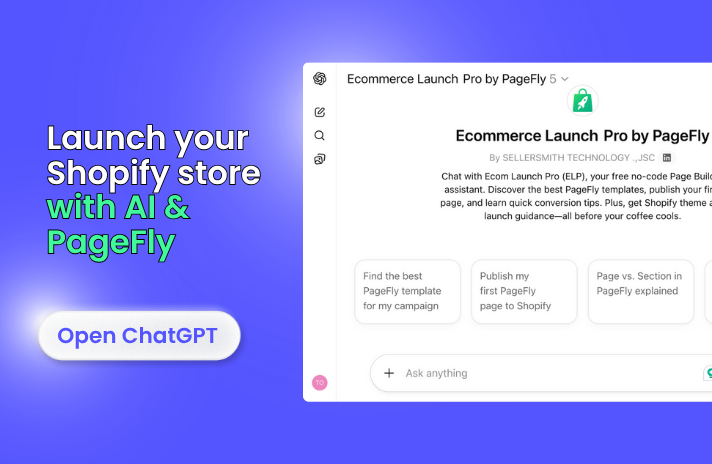
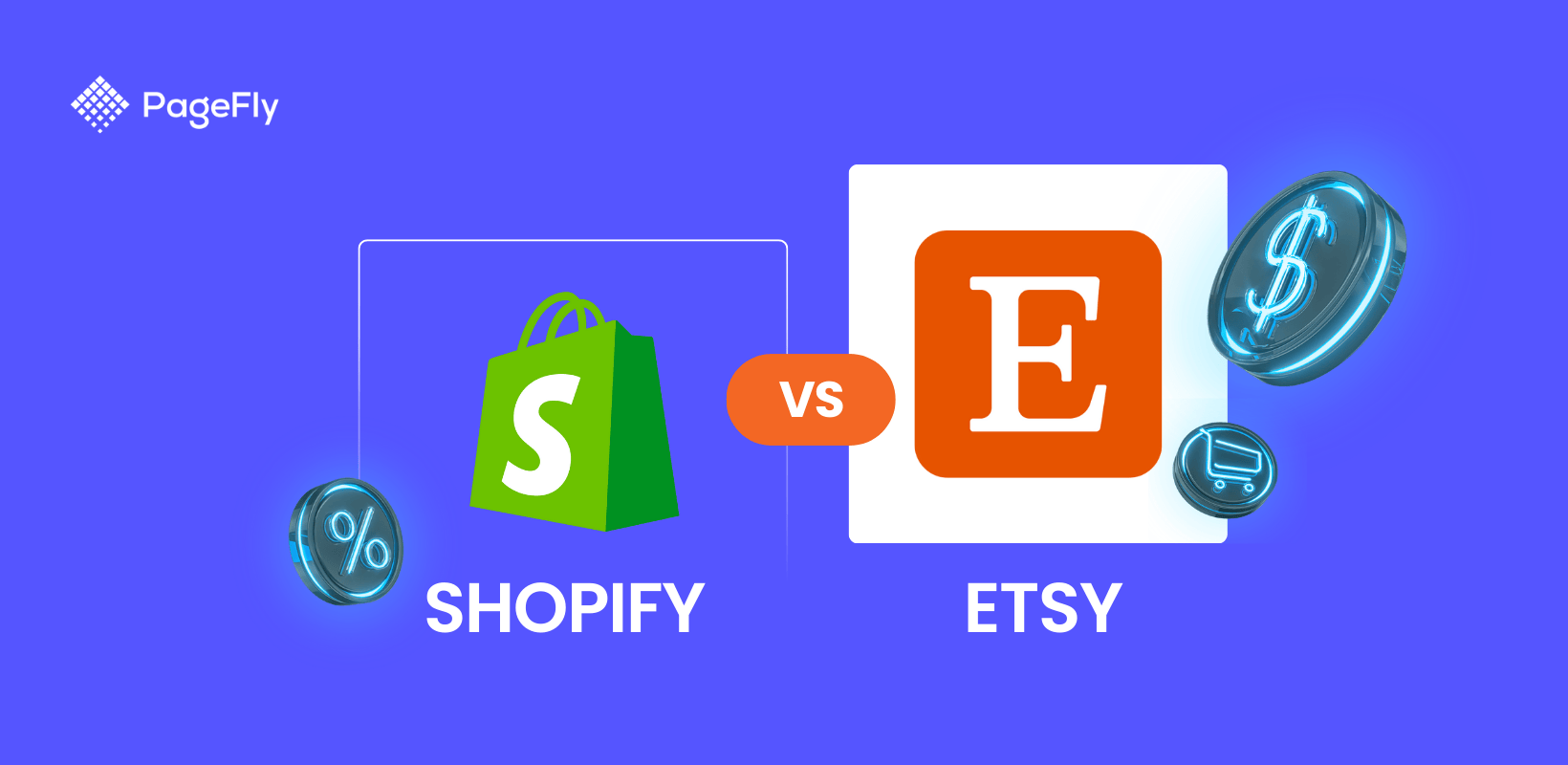

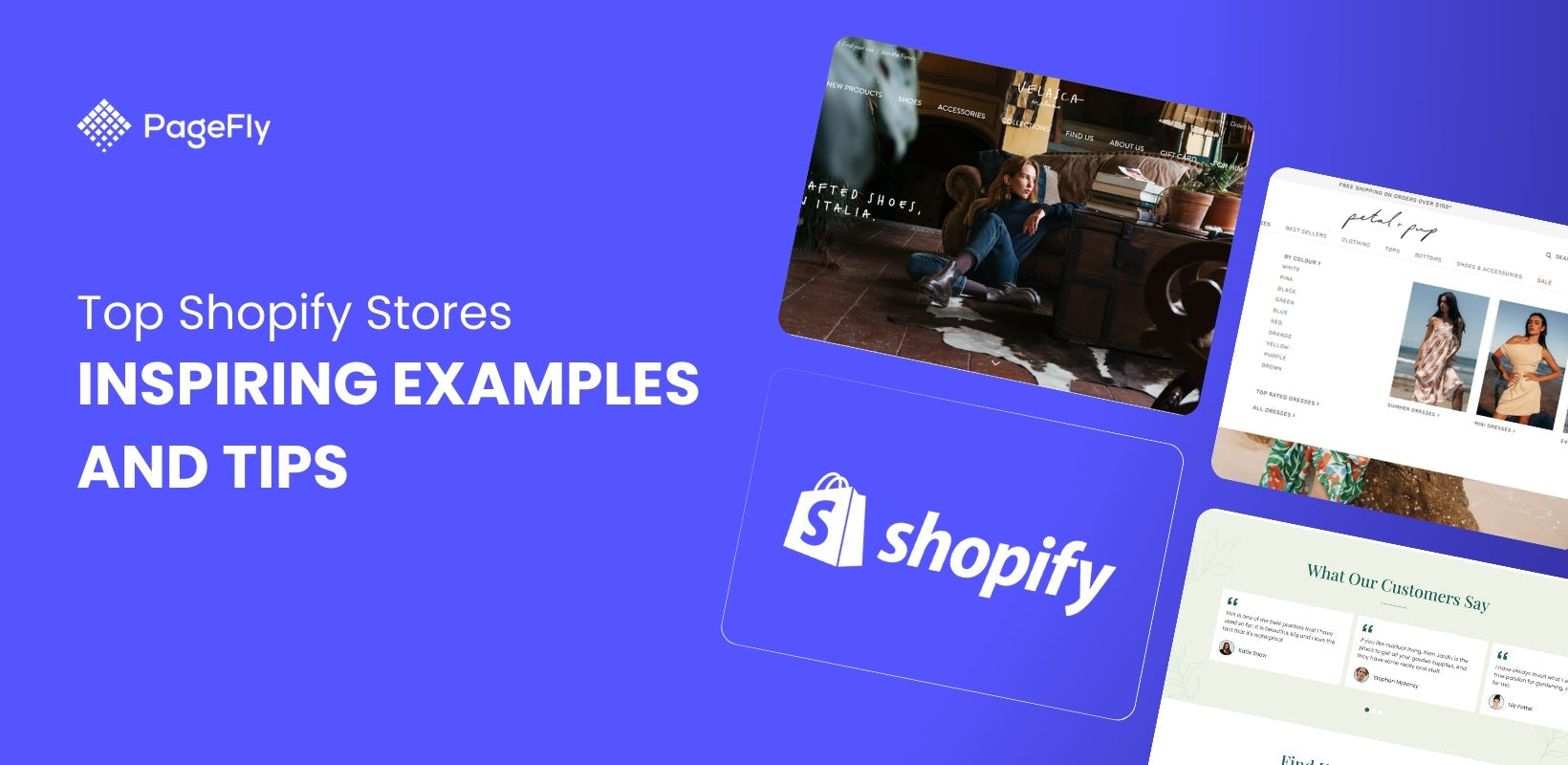
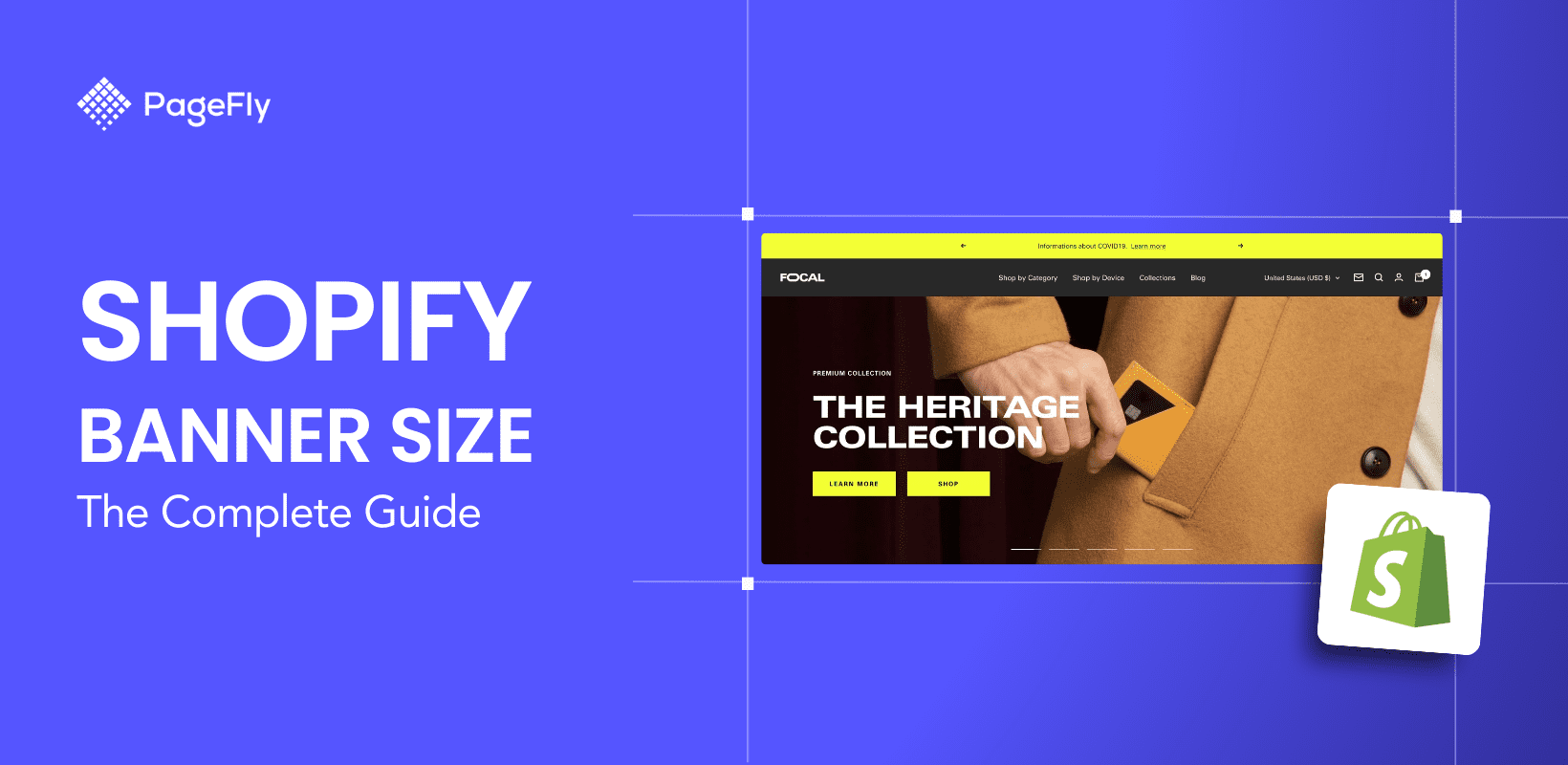
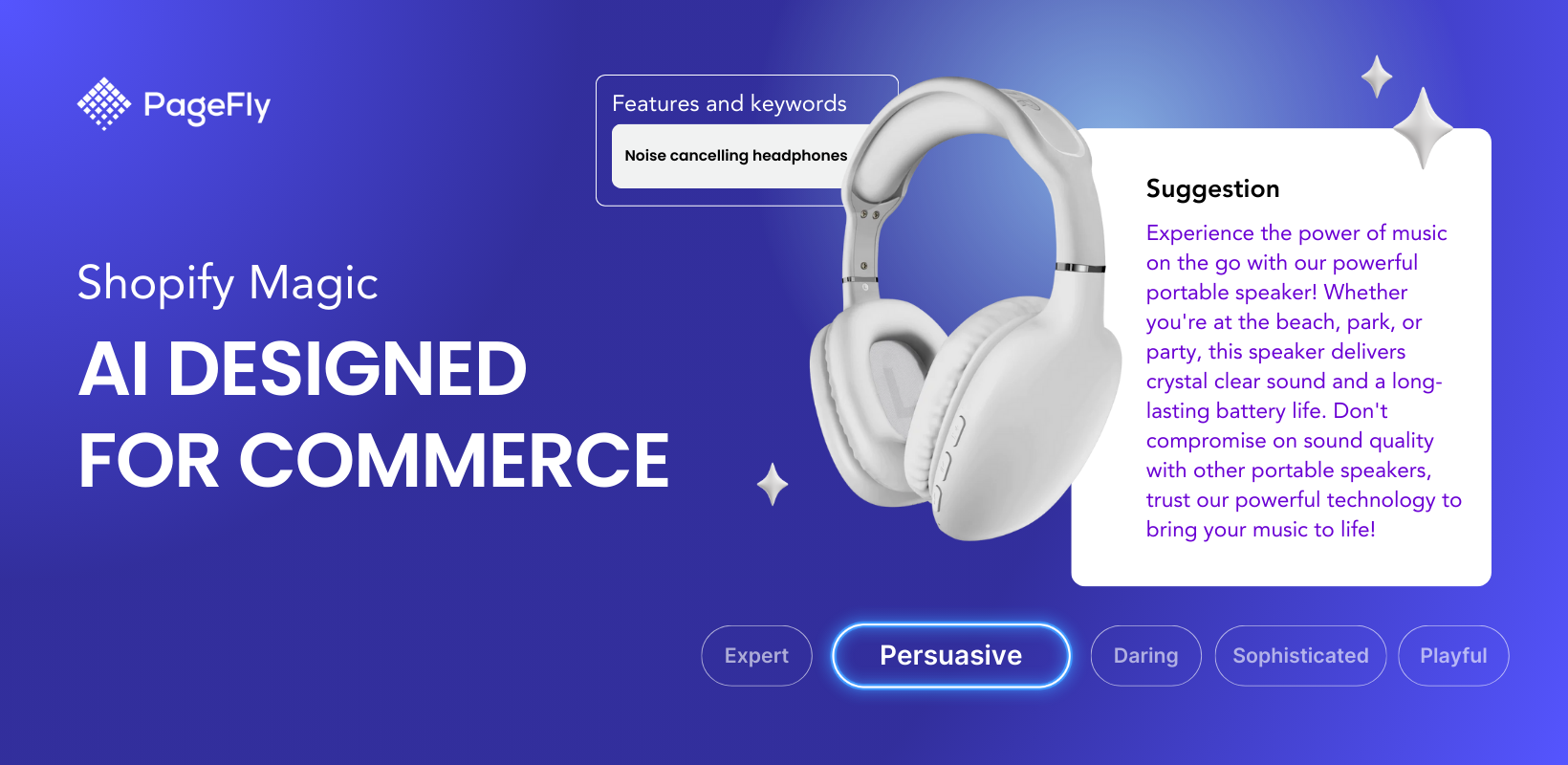
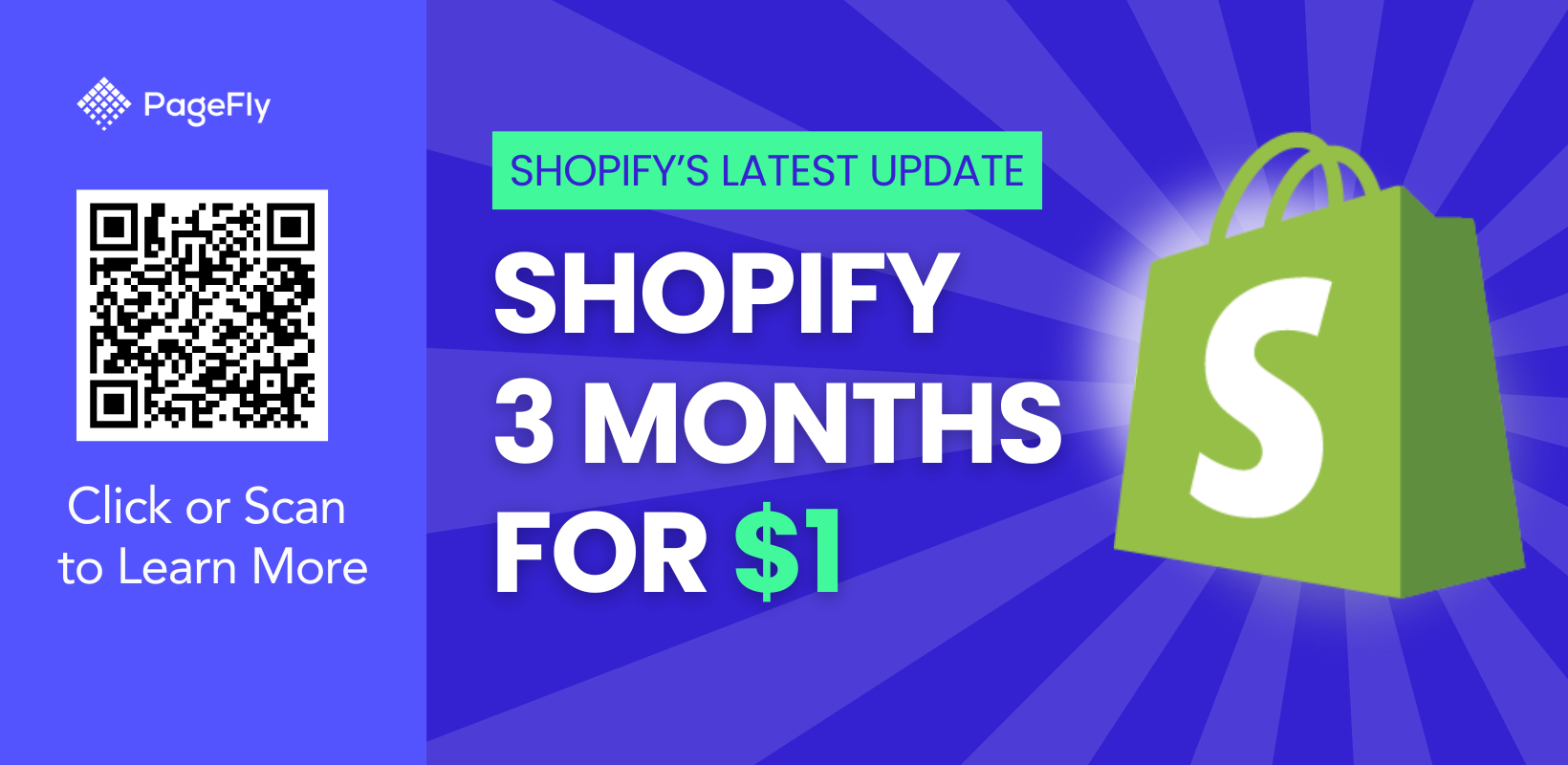
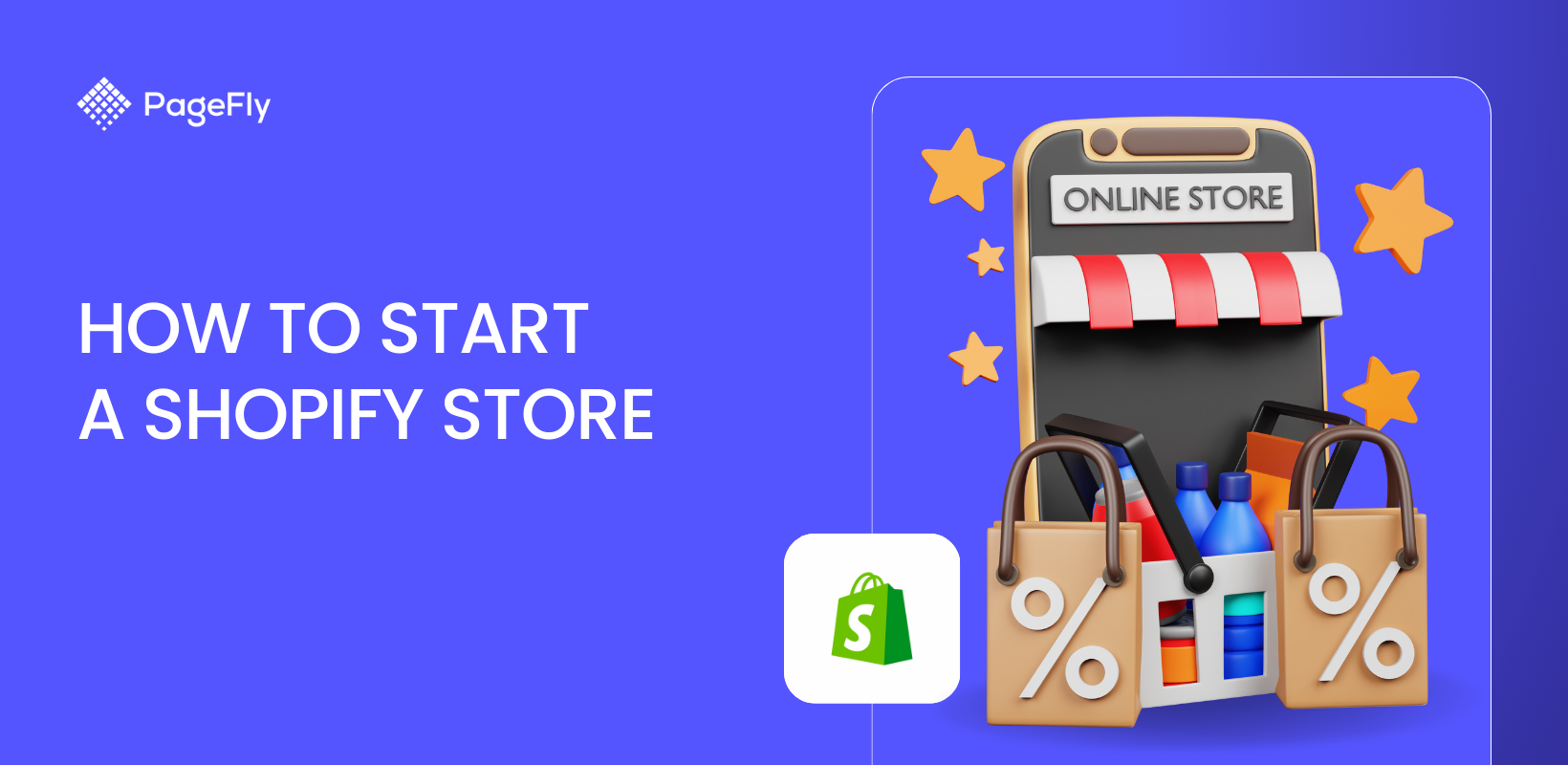
![27 Best Shopify General Stores + Complete Strategy Guide [2025]](http://pagefly.io/cdn/shop/articles/Best_Shopify_General_Stores_2f9d09f2-7c38-4da9-a495-e9f4898ddd68.jpg?v=1757271936&width=1640)
